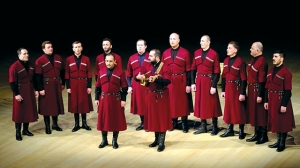Georgian Polyphony Given Status of ‘National Importance’
Intangible cultural heritage ‘Georgian Polyphony’ has been identified, along with the tradition of the Georgian Supra (traditional feast- see page 16), as having the status of “national importance,” a fact that is expected to promote, preserve and transmit unique Georgian culture and traditions to future generations.
Georgian polyphony, recognized by UNESCO in 2001 as a masterpiece of the oral and intangible heritage of Mankind, has always been an integral part of the traditional musical culture and existence of the Georgian people. Through syncretistic forms typical of the pagan era, it expressed the features and representations of the vision of the world, firstly of the Kartvelian tribes and later of the Georgian nation.
In the Christian era, it continued to be an integral part of both secular life and theological worship and, along with folk performances, expressed the Christian outlook of the Georgian nation. Changes in public life since the 1980s have also been reflected in Georgian traditional secular and theological polyphony.
In some villages of Georgia, secular polyphony, which is mostly original, still exists in the form of performances. Due to its high artistic value, it currently performs an artistic and aesthetic function and represents one of the most important factors of the Georgian national identity.
Georgian polyphony was granted the status of ‘Intangible Cultural Heritage’ in 2014.
By Mariam Merabishvili
Image source: playbill.com











